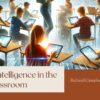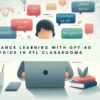When we think of learning, textbooks, lectures, and classroom discussions come to mind. But there’s another way to engage students, a method as old as human civilization itself—storytelling.
In the digital age, this method has evolved into a new form: digital storytelling. It is a compelling approach that can bring any subject to life, be it English, history, science, or math.
Digital storytelling involves using multimedia elements such as text, graphics, audio, and video to convey narratives. At the heart of every digital story are creativity, expression, engagement, and, of course, learning.
In this article, we will delve into how digital storytelling can revolutionize the classroom, energizing students and making learning more impactful across various subjects.
Digital Storytelling: A Blend of Creativity and Technology
Before we delve into specific subjects, it’s essential to understand what digital storytelling entails and it is potential for learning. Digital storytelling in education integrates creative skills such as narrative arc development, character development, setting description, and theme exploration with technical skills like multimedia production, editing, and distribution.
This blend of creativity and technology has several benefits, such as enhancing student engagement, fostering collaboration, and developing a deeper understanding of the subject matter.
Now let’s explore how digital storytelling can be applied across various school subjects.

Digital Storytelling in English
Digital storytelling in English classes opens up numerous possibilities for both teaching and learning. It allows teachers to introduce literature pieces like classic novels or plays in an interactive manner. For instance, students could recreate a scene from Shakespeare’s “Romeo and Juliet” through a digital narrative.
This process not only enhances comprehension but also enriches students’ vocabulary and promotes critical thinking.
Additionally, digital storytelling can be effectively incorporated into creative writing exercises.
By transforming their written stories into digital narratives, students are encouraged to explore their creativity while simultaneously honing their writing skills.
Digital Storytelling in History
In history classes, digital storytelling can provide a platform for students to delve deeper into specific historical events or periods. For example, a digital narrative about World War II from various perspectives can provide a comprehensive view of the event.
Digital storytelling also encourages the use of primary sources, such as letters, diaries, and photographs. Incorporating these elements into digital stories adds a layer of authenticity and provides a nuanced understanding of historical occurrences.
A project like “A Day in the Life of…” could be particularly effective, where students depict daily life in different historical eras through digital narratives.

Digital Storytelling in Science
Digital storytelling offers unique opportunities for teaching and learning in science. It can help explain complex scientific concepts, such as the water cycle, through the detailed journey of a water molecule. Additionally, digital storytelling provides an engaging platform for students to present their science experiments.
By weaving their hypotheses, methods, observations, and conclusions into a digital story, students can more effectively communicate their scientific explorations.
Digital storytelling also aids in demystifying abstract scientific concepts. Animated explanations or visualizations can make these concepts more tangible and easier to comprehend.

Digital Storytelling in Math
Mathematics can be perceived as a challenging subject for many students, and digital storytelling can serve as an effective tool to tackle this issue.
Using digital storytelling, teachers can illustrate mathematical concepts such as ratios and fractions using real-life scenarios. This approach aids students in visualizing and understanding these concepts better.
Digital storytelling can also be used to break down complex problems into simpler steps, making the problem-solving process engaging and comprehensible.
Moreover, students can apply their mathematical knowledge to real-world situations through projects like planning a budget or designing a house and present their findings in an interactive digital story format.

Conclusion
Whether it’s English, history, science, or math, digital storytelling offers a creative and engaging approach to learning. It brings subjects to life, fosters creativity, enhances engagement, and cultivates a deeper understanding of the topic at hand.
While incorporating digital storytelling into your lessons may seem challenging, the payoff in terms of student learning and engagement is well worth it. For further reading, innovative teaching: how digital storytelling transforms the EFL classroom offers insights into successfully applying this method in your classroom.
Digital storytelling is not just a teaching tool for today—it’s a powerful means of shaping the future of education. Let’s embrace this innovative approach and start telling stories that educate, engage, and inspire.
“Storytelling is the most powerful way to put ideas into the world today.” Robert McKee
For additional research and resources on digital storytelling in education, you can check out these scholarly articles:
- Digital Storytelling and Implications for Future Learning
- Digital Storytelling as a Learning Tool in Education
- Digital Storytelling: A Powerful Technology Tool for the 21st Century Classroom
- The Impact of Digital Storytelling on K-12 Education
- A Comprehensive Study of Digital Storytelling in Education
Please remember to engage your students in the feedback process after their digital storytelling project is done. Their insights and experiences will help improve future projects. Also, don’t forget the importance of publishing and distributing their stories so their voices can reach an audience beyond the classroom.
Happy storytelling!









Recent Comments